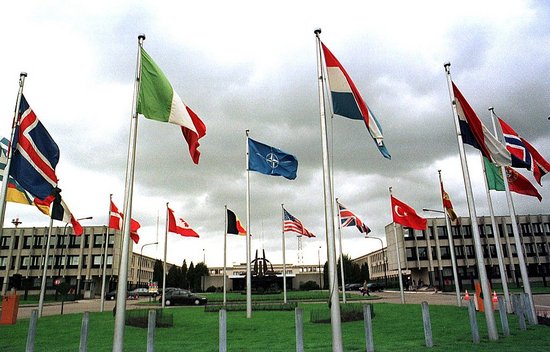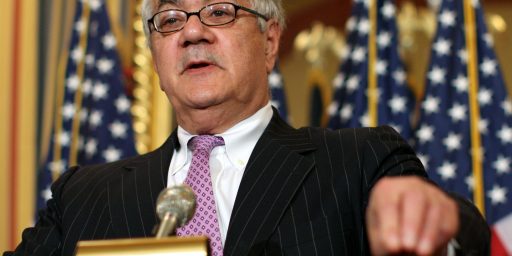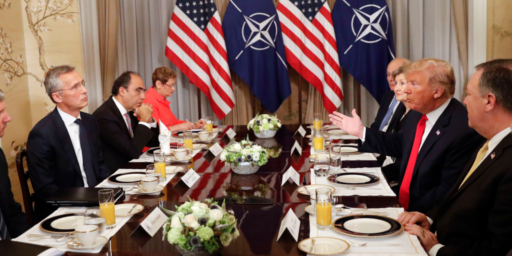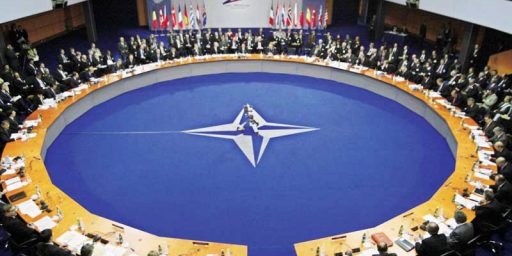Does U. S. Support for NATO Serve a Strategic Purpose?
Does NATO membership serve a strategic purpose?
The Huffington Post quotes Massachusetts Representative (and, presumably, ranking Democratic member of the House Financial Services Committee in the next Congress) Barney Frank as denying that U. S. support for NATO has a strategic purpose:
“These kind of restrictions on domestic spending with unlimited spending for the war — and you always have to talk about both — is a great mistake,” Rep. Barney Frank (D-Mass.) told The Huffington Post last week. “And the liberal community’s got to focus more on Afghanistan, Iraq, NATO. NATO is a great drain on our treasury and serves no strategic purpose.”
Lawrence Korb, senior fellow at the Center for American Progress, seconds him:
“Barney Frank has a good point,” said Korb. “We ought to rethink the whole idea of NATO.”
The first NATO Secretary General, Lord Ismay, famously quipped that the purpose of NATO was “to keep the Russians out, the Americans in, and the Germans down”. Clearly, those goals are obsolete.
NATO’s budget has two primary components: the civil budget and the military budget. In fiscal 2009 and 2010 the U. S. paid $66.1 million and $84.1 million, respectively, for the NATO civil budget and $408 million and $430 million, respectively, for the military budget. That’s less than one half of one percent of our military spending, an appreciable amount to be sure but a drop in the ocean of U. S. military spending. For our half billion dollars per year we’re getting support from our NATO allies in Afghanistan, military coordination with those NATO allies, and reduced transaction costs for our interactions with them. IMO that’s probably worth the half billion per year we’re spending for NATO membership.
Still, the question is worth asking. Does U. S. support for NATO continue to serve a strategic purpose? Are we getting value for our money?
There’s one more aspect of the question that I think deserves consideration. A linchpin of the Obama Administration’s foreign policy has been a renewed cooperation with international institutions. Will this mean the actual existing international institutions, of which NATO is a significant example, or hypothetical international institutions?







Surely some of this is long-thinking. If NATO might be useful fifty years from now, there might be some long-thinkers in government who argue to keep it for that reason.
(Also a justification for keeping all the global bases that seem to have no practical purpose in the next decade or so.)
Let me say this another way, jp. If he’s being quoted accurately I think that Rep. Frank is grandstanding. NATO membership isn’t “a great drain on our treasury” and it looks to me as though we’re getting a pretty good ROI now. No need to resort to long-range contingencies.
I wouldn’t argue to kill NATO based on current cost or ROI. Agreed. At the same time though I do see current costs as kind of an insurance premium against worst futures, in which it is actually needed.
I agree with you guys. NATO as a counter to the USSR is obviously a pretty dated concept, but it’s still a useful alliance. I wonder if Frank was playing a game with the Republicans, daring them to make cuts to NATO, defense, etc. …
NATO is still worth doing. That being said, England, France and Germany need to start pulling their weight as far as defense spending goes.
I couldn’t agree with you more on that point, anjin-san. As the other major powers in NATO drift increasingly away from the military spending commitments they’ve made to the alliance, it becomes similarly increasingly difficult to explain why we’re spending so much. We’ve got to find a formula for Germany, France, and the UK keeping their military spending above 2% of GDP. I’m not sure what that formula is.
I think NATO played an important role in the early 1990s of assuring other countries in Europe that German re-unification wouldn’t lead back to the Bad Old Days.
Certainly its expansion into Eastern Europe, and continued existence after the 1990s, is not particularly vital and necessary. It’s basically a tool for the US to keep a foot in Europe, keep up links with European militaries, and rope NATO into providing support for US-led missions elsewhere. We probably should have begun phasing it out in the late 1990s/early 2000s.
I don’t mind if Germany and France don’t spend a lot on their own military – the politics in their country make that difficult -but they need to kick in more funds for some of the humanitarian missions run by the military/NATO members to make up the difference in what they are saving by being in NATO.
I think the alliance is useful, although one that will likely be tested more in the future (the whole an attack on a NATO member is an attack on all kind of thinking), but there is some usefulness to it.
Whether the money we spend on it currently is worth how much use we get is the real question.
I do think the US could and should pull a lot of its troops out of Europe-permanently keeping US soldiers stationed in Europe makes little sense to me-although I can be persuaded that it does.
Germany doesn’t have a permanent base in the US to be our NATO ally do we need one in Germany to be theirs?
I’m wondering if, when he said, “NATO is a great drain on our treasury and serves no strategic purpose”, he wasn’t using ‘NATO’ as shorthand for our bases in Europe.
I believe it was Kissinger who said that one indicator of the success/usefulness of an alliance is the belief that it is no longer necessary. (I’m paraphrasing of course). The alliance has expanded such since then that it does call into question whether we would go to war over,say, Ukraine (not a member yet but seriously proposed) or any of the other former Soviet republics. The definition of collective security of which NATO is an example is an attack on one is an attack on all. That serious stuff.
You may be right, sam. He may have used a specific, NATO, when he intended a generality, “U. S. military spending in Europe”. I don’t think that entirely lets him off the hook. There’s a big difference between recommending that people sell their Cisco stocks and recommending that people be cautious about technology stocks, generally.
Well, you know when the new Republican Congress is looking to cut domestic spending totally by gutting Department of Education, National Science Foundation, etc, 500 million dollars is nothing to sneeze at and may help save some domestic cuts.
Don’t know about that Hauty. Money spent by the Dept. of Education had done exactly what for the quality of education? The National Science Foundation supports the THEORY of global warming against real scientific evidence (just look outside) During economic down turns, Government still has some legitimate jobs. One of the most important is defense. Nato might seem like a waste of money to many people but this country spent a great deal of blood and treasure to keep from having to speak German during the last century. I do not know what WWII cost in 2010 dollars but I’ll bet it was a hell of a lot more than either Iraq, Afghanistan or both. What would be the cost of 30,000 tanks and the same number for fighers and bombers? How about the cost of 45 Aircraft Carriers? That be some expensive shit. I think what little we spend today in comparison to what not spending it could cost might be a better way to look at it. There are those who say that old stuff could never happen again. That is what the intellectuals said after WWI. Look how that turned out. What are we to do in the coming civil wars in Europe between Muslims and the rest?
“Don’t know about that Hauty. Money spent by the Dept. of Education had done exactly what for the quality of education?”
http://super-economy.blogspot.com/2010/12/amazing-truth-about-pisa-scores-usa.html
Steve
“What are we to do in the coming civil wars in Europe between Muslims and the rest?”
Great…we should base our defense policy on delusional fantasies…what the hell, we were already told about a smoking gun turning into a mushroom cloud and we see how well that turned out…
Until Russia is a stable democracy (it is neither) we’re going to need NATO. You take a good hard look at Russia you’ll see a failing state tearing itself to pieces with a declining population. Where once the Soviet Union was a first world army supported by a third world society, now Russia is a second world army supported by a third world society.
Mark my words, when Russia is a stable democracy—no cult of the leader, no political shenanigans—then you can dissolve NATO as it will be unnecessary. Until then NATO remains vital to our security, and the security of Europe as a whole.
An Interested Party
You have been following the news out of France? Sir, when the police refuse to go into certain neighborhoods because they fear the reaction of the locals, then you’ve got yourself a civil war. A low intensity civil war, but a civil war. And with territory to call their own the insurrectionists have bases from which they can strike out at the rest of France. By the time this insurrection becomes too blatant for any but the most self-servingly clueless to ignore, then you’ll be watching a high intensity civil war years, maybe even decades, in the making.
Remember, Islamists aren’t interested in coming to an agreement, they want victory.
“The National Science Foundation supports the THEORY of global warming against real scientific evidence (just look outside) ”
Worse, they support both the theory of General Relativity and the theory of Quantum mechanics, though they’re mutually contradictory as currently conceived. And they support both thermodynamics and classical mechanics, though they too are mutually contradictory (look up the Poincare recurrence theorem).
Wow, this is a sewer, isn; tit.
Whoops, I meant to write: Wow, this is a sewer, isn’t it?